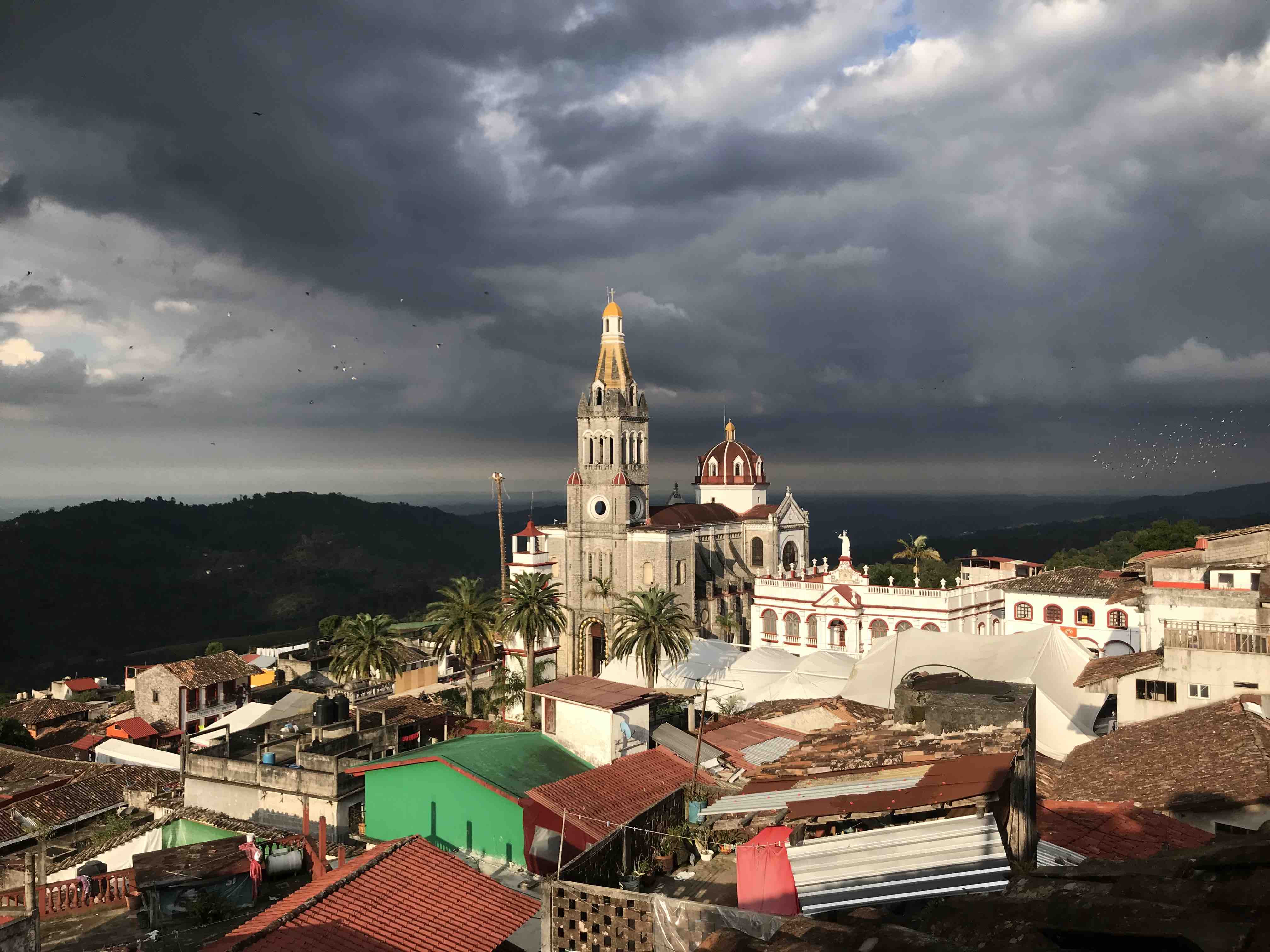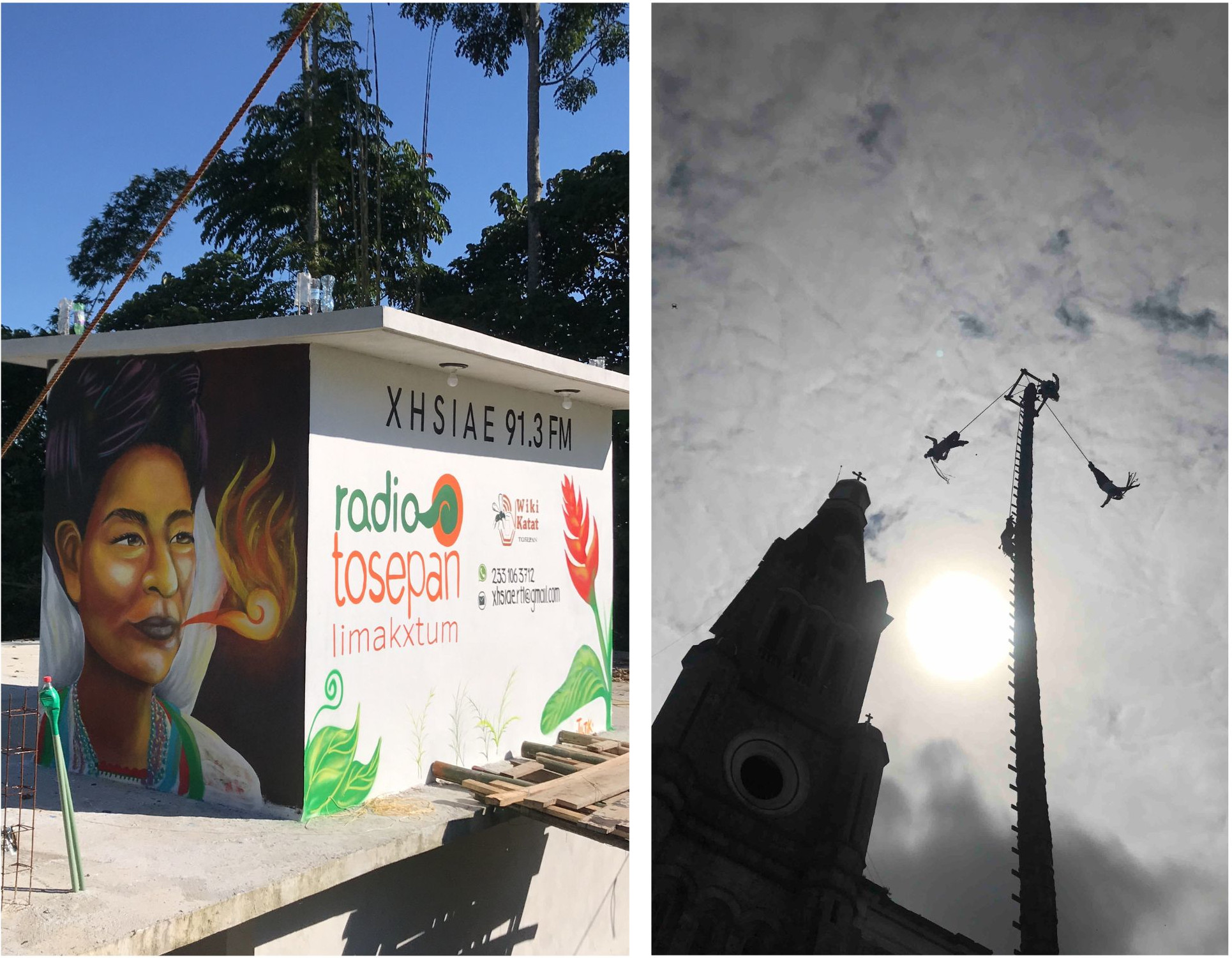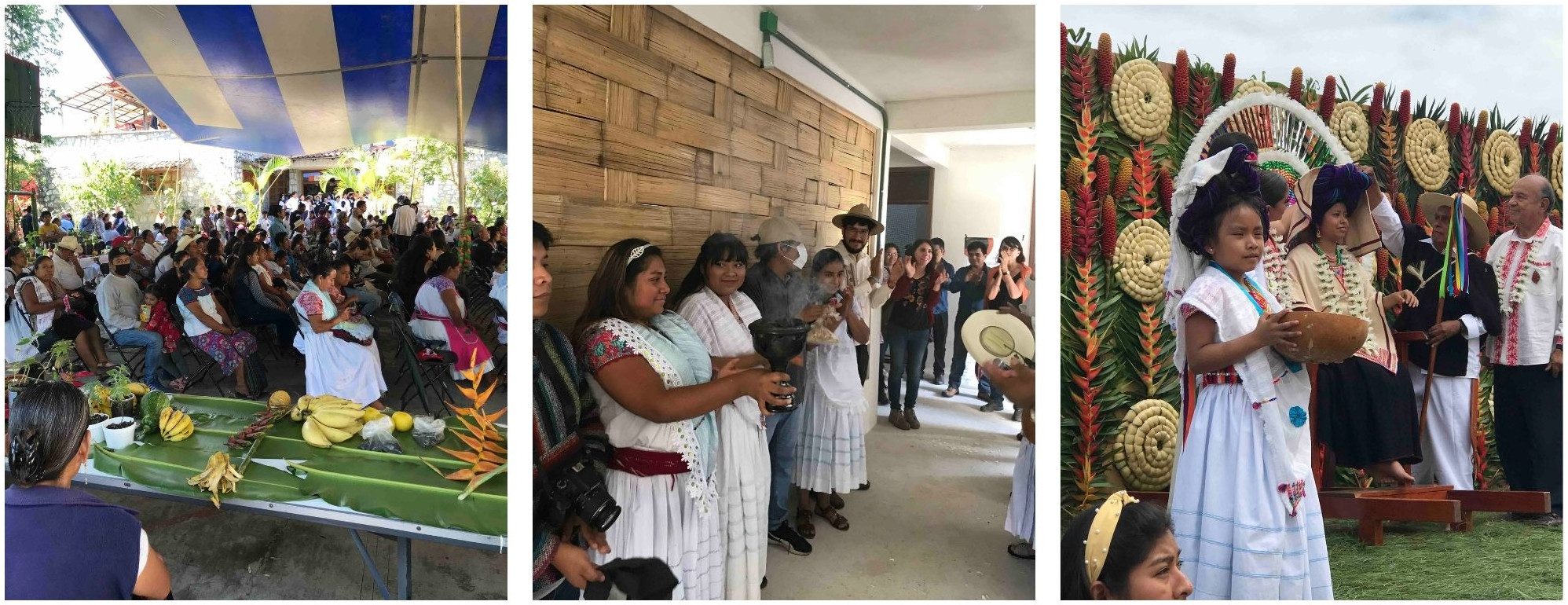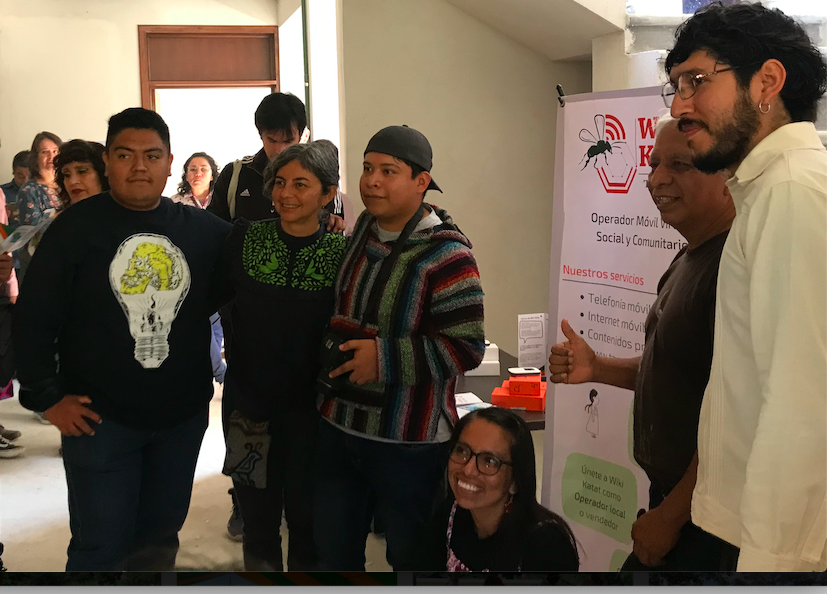
Promoting sustainable and self-managing community networks helps close the digital gap. Noteworthy initiatives advancing toward that goal include Wiki Katat, the first virtual mobile operator headed by a rural and Indigenous community in Mexico. In this piece, Attorney Adriana Labardini, a collaborator of APC and Rhizomatica in the Local Networks initiative, shares this innovative model that combines the provision of internet services and mobile telephony with linguistic autonomy and local content production.
In 2022, 45 years after the founding of the Union of Cooperatives Tosepan Titataniske (“United we will triumph,” in Nahuatl), in the mountains of northeast Puebla, Mexico, two landmark events were marked by its Masewal and Totonacan members: the 10th anniversary of Radio Tosepan Limakxtum and the launch of the first community mobile virtual network operator (CMVNO): Wiki Katat. Representatives of Rhizomatica and Redes A.C., organisations that have supported the Union of Cooperatives to make this dream a reality, were guests at this important event.
A communal history

The city of Cuetzalán in Mexico.
Faced with the constant and prolonged abandonment and marginalisation of several mountain communities beyond Cuetzalán, their inhabitants have seized the reins of their fate. In effect, their vision of prosperity, Yeknemilis or "good living" through autonomy and strengthening their way of life and relationships, which they call Totasohtalis, drove them to take a hand in securing their sustainability. To accomplish that, they organised effectively and created a network of communities and productive cooperatives. Years later, this network will blaze the trail toward a sustainable form of shared local economy, even in times as adverse as their prolonged isolation due to the COVID-19 pandemic.
More than 50 years ago, Tosepan understood the importance of community organisation and cooperativism as vehicles to produce or gain access to credit through savings funds as a product of early education in the principles of Yeknemilis. For the communities, cooperatives are tools, in this world view, to care for what they value most: their territory, their identity, their traditional knowledge, and their forms of communication.
Farmers and beekeepers organised to produce honey and its derivatives. The Tosepantomin savings bank grew as their best means of gaining access to capital when the financial community closed its doors to them. Tosepan Titataniske organised coffee, pepper and cinnamon growers, all striving to expand their knowledge and techniques of production and distribution of their products: high-quality honey; unique handcrafted textiles; ecological use the of plants which form the basis of traditional medicine; and ecotourism with sustainable building materials like bamboo, stone and adobe.
Without communication there is no territory
As regards communication, an essential thread in the Indigenous world view to preserve the territory, we have much to learn from Indigenous peoples. As I have been told, in their world anything you stop naming ceases to exist. If you stop telling stories, then you stop transmitting knowledge, joy, memories. Communication forms the threads with which community life and celebration are woven, and therefore without communication there is no territory.
Starting in the year 2009, the communities undertook training in order to communicate what is important to them. As Paulina, president of the Union of Cooperatives, said in the ceremony commemorating the 10th anniversary of Radio Tosepan: "Yes, technology is important, but what is even more important is that it be ours, to preserve our autonomy."

Artwork advertising the radio and Wiki Katat decorates a wall (left) and a performance by the Papantla flyers in Cuetzalán, Puebla (right)
In the year 2012, members of the communities began radio broadcasts from Cuetzalán and participating in training communicators to revitalise the Nahuatl and Totonac languages. In 2016 they re-enrolled in a diploma course in community work offered by Redes, A.C., with support from the International Telecommunication Union, and in 2018 they finally received a concession from the Federal Telecommunications Institute to broadcast on the frequency 91.3 FM. Still, they wondered: Why should we need a concession from the state on our own territory and why are we forced to broadcast electoral propaganda if the political parties do not govern here?
The reflection is relevant and more valid than ever: Sovereignty is fundamental in the use of the radioelectric spectrum in Indigenous territories. The states have legislated for decades without recognising the autonomy of Indigenous peoples, even though it is recognised in the Mexican Constitution. In the end, as Paulina remarked:
"We decided to apply for the concession because having it entails rights, recognition and certainty. Also, in the future this unique concession will allow us to provide other services, including both radio broadcasting and telecommunications. And look: four years later we’re the first community mobile virtual network operator."
What is a community mobile virtual network operator?
Floriberta Lino, a host on radio Tosepan, describes having attended meetings of the Union and receiving calls which she could not answer properly due to the poor cellular signal quality. She recalls having to move constantly to find the signal and not always succeeding. Other times she could receive calls but could not call out because her credit had run out in just three days or the balance paid to be used on calls or text messages had expired. "We need our telephone service like we needed our savings bank to gain access to credit without paying exorbitant interest," she told me. “And so, as part of our communication and community cooperatives, with the help of Redes, A.C., we embarked on a new dream: community mobile telephone and internet service.
”In 2020 the Tosepan Union of Cooperatives received news of the presence in Cuetzalán of the nationwide, wholesale 4.5 G mobile network named Altán Redes, a company in which the Mexican state holds a majority share. Altán cannot offer retail service to the public, but only to other operators, which are called virtual because they operate on third party infrastructure. They purchase capacity wholesale to in turn offer retail voice, messaging and data services with their own branding, for end users.
In Cuetzalán, Altán installed its radio base but no local virtual network operator used it, while the mountain villages around Cuetzalán remained isolated for lack of connectivity.
Redes A.C. and Rhizomatica approached Altán to propose activating the first community mobile virtual network operator on their network through the non-profit that operates the community radio and already holds a unique concession. The Union expressed an interest, on the condition that the CMVNO be understood as a social, cooperative, non-corporate project and as such with needs different from those of urban MVNOs. The dream was to offer high-quality mobile telephone and internet service at affordable prices for the communities, so that it would also work nationwide without changing the user’s SIM card. In other words, so that the cellular chip that the local virtual network operator sells could be used with the same telephone number nationwide, on either the Altán network or on other carriers with which Altán has roaming agreements, as a guest user.
Thus, in 2020, at the height of the pandemic, the Union of Cooperatives and Altán started their negotiations. In late 2022, the Mexican government moved in to rescue Altán with a 2 billion-dollar investment that saved it from impending bankruptcy.

Celebrations for the tenth anniversary of Radio Tosepan Limakxtum and the launch of Wiki Katat.
Under Mexican regulations, a virtual mobile operator may have different levels of technical dependency in relation to the operator that owns the network. From a reseller of calls, SMS and data with its own branding and customer management system over the interface with Altán (which entails costs and requires training) to an MVNO with its own infrastructure and interconnection links with other networks, among other assets.
Wiki Katat opted for the first model, using the Titataniske network of cooperatives as service distributors and creating an intranet with their own local content that allows the communities and their cooperatives to appropriate the technology on their own terms and fulfill their own dreams, without fomenting a consumerism focused on services alien to their principles, languages and aims.
After a lengthy internal process of decision making, training and negotiations, today Wiki Katat is a reality. It offers voice, SMS and data services for smartphones as a shared wireless data service, over a mobile modem or MiFi.
Local content

The launch of Wiki Katat in October 2022
The chance to access local information and content through taewaloni distinguishes this operator from others. It reflects the importance of autonomy and their own local content.
For partners in the cooperatives, Wiki Katat represents both an affordable 4 G service and a potential source of income through distribution of SIM cards and top-ups. For users it is an alternative that offers savings, access to an intranet with content in their native languages, and the benefits of promoting the communal economy. It also constitutes a source of technological learning for the communities, which empowers them and strengthens their autonomy.
For women in the community, who have shown an intense interest in and commitment to radio and Indigenous communication, Radio Tosepan and Wiki Katat represent an opportunity to express themselves, to go into business for themselves, and to find new ways to gain financial independence. Going from captive consumer to operator, administrator, communicator or content developer on a community network is a huge step forward for the women of Cuetzalán and its surrounding communities.
No doubt it is a challenge to build the confidence to attract new users who today lack internet access, or people who currently purchase a commercial service with more limited coverage and can migrate to Wiki Katat. Success will largely depend on how well the cooperatives communicate the importance of this local effort but also on Altán’s ability to give all its MVNOs the same level of quality nationwide. Altán has been using satellite links in remote places like these as backhaul, with serious problems of quality and high latency in voice service, leaving rural virtual network operators with a level of service greatly inferior to that of urban MVNOs. In December 2022, Altán deployed a microwave link which improved the connection in Cuetzalán, aware of the importance of offering a uniform service in all regions of the country, failing which it will fall short of accomplishing its mission of fair, affordable, high-quality digital inclusion capable of closing the urban-rural digital gap.
Altán still faces several challenges. To achieve economic and operational sustainability, it needs to generate higher demand for virtual network operators, but it is growing substantially.
For community networks that want more than self-supply of internet access but also want mobile telephone services without the need to deploy their own network, I think an MVNO is a good option if the wholesale offering is attractive in terms of price and minimum purchase volume in marginalised areas or areas with low population density. For the communities of this mountainous region in Puebla, it offers an affordable option, the opportunity to offer their own content in locally spoken languages, and a pathway of autonomy and technological and management training so that women and young people are not forced to migrate. We look forward to seeing more users subscribed to Wiki Katat and to seeing many Indigenous communities throughout Mexico replicate this model, which is based on community organisation and the development of community technicians and communicators.
Speaking today, I am a user proud to have changed my chip from a commercial carrier to Wiki Katat. It sounds simple but it has been a tortuous, lengthy process plagued with obstacles for Indigenous peoples to exercise their right to autonomy and their own communication in their daily lives.
Photos: Adriana Labardini Inzunza